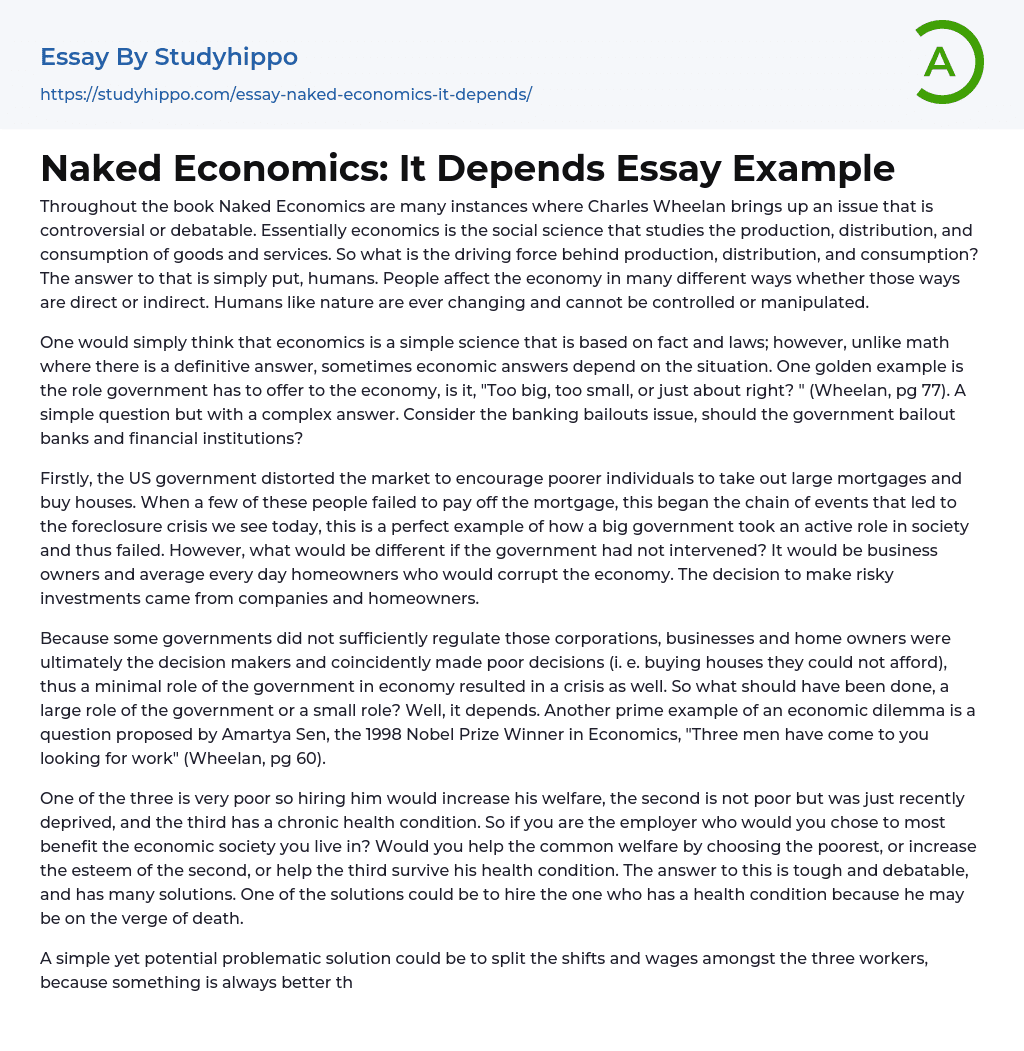Charles Wheelan explores a variety of controversial topics in his book Naked Economics. Economics, as a social science, studies the creation, distribution, and consumption of goods and services. The economy is ultimately shaped by human actions and behaviors. Individuals have significant power over the economy through direct or indirect methods. Just like nature, humans are constantly changing and cannot be regulated or manipulated.
Economics, similar to mathematics, is considered a precise science based on facts and laws. However, unlike mathematics, economic solutions can vary depending on specific circumstances. One area that exemplifies this complexity is the role of government in the economy - determining its size and influence poses a seemingly simple question with an intricate answer.
An example of this complexity is the issue of banking bailouts. Should the government intervene to rescue banks and financial institutions? Initially, in the U
...S, the government intervened to encourage less affluent individuals to acquire substantial mortgages and purchase homes. However, when some of these individuals were unable to repay their mortgages, it triggered a series of events leading to today's foreclosure crisis.
This demonstrates how an expansive government actively participated in society but ultimately failed. Nevertheless, one must consider what would have happened if the government had not interfered. In such a scenario, it would have been business owners and everyday homeowners who caused damage to the economy through risky investments.
Insufficient government regulations resulted in both businesses and homeowners having to make critical decisions without guidance. Unfortunately, many individuals made unwise choices such as purchasing homes they couldn't afford, leading to an economic crisis. As a result of the absence of government intervention in the economy, this unfortunate sequence of
events occurred. The question arises: should the government have a larger or smaller role? The answer depends on the specific situation at hand. Amartya Sen's 1998 inquiry further highlights this economic predicament: "Three men have approached you seeking employment" (Wheelan, pg 60).
One of the three individuals is living in extreme poverty, so hiring him would improve his overall well-being. The second person has recently experienced a loss of resources but is not currently poor. The third individual suffers from a chronic health condition. As an employer, you must consider which decision would bring the most benefits to the economic society in which you reside. Should you prioritize helping the most impoverished individual, boosting the second person's self-esteem, or assisting the third person in managing their health condition? This question is difficult and subject to debate, with multiple possible solutions. One potential solution could involve hiring the person with a health condition as their condition may be critical and require immediate support.
One possible solution is to divide the shifts and wages among the three workers, which is a simple but potentially problematic approach. This division would provide some income for all workers and contribute to the employment rate, ultimately leading to increased spending. However, it should be noted that this choice is subjective rather than factual, as all three workers equally benefit the economy with their efforts. Thus, the question of who should be chosen remains unresolved.
A topic that sparks compelling debate is free trade versus protectionism (Wheelan, pg 193). Free trade ensures efficient allocation of resources and lower prices for consumers by granting equal access to all markets. However, whether this theory can effectively be
implemented remains a subject of debate. The issue of free trade encompasses various perspectives on accepting global foreign trade for cheaper prices but facing increased domestic competition versus implementing global trade barriers to protect domestic jobs.
Free trade establishes trust and camaraderie among nations, offering a preventative measure against war. However, it can also potentially incite conflict if trade relations deteriorate. Inherent to free trade is the importance of lower prices, with an imperative for a tariff-free global economy in order to sustain optimal worldwide productivity. By effectively allocating resources on a global scale, there is minimized waste and increased accessibility to reasonably priced goods for consumers.
Some economists argue that international economics is more than just improving global trade efficiency. They suggest that although cheaper prices may become more accessible, this could result in a reduction in American jobs and companies. It is clear that the USA places importance on its citizens' jobs rather than lower prices. As a result, there is no definitive answer but rather subjective opinions on whether one should be prioritized over the other. Like many economic questions, the answer often relies on various factors.
- American Dream essays
- Barriers To Entry essays
- Capitalism essays
- Central Bank essays
- Compensation essays
- Consumerism essays
- Economic Development essays
- Economic Growth essays
- Economic Inequality essays
- Economic System essays
- Economy essays
- Employment essays
- Export essays
- Finance essays
- Free Trade essays
- Gross Domestic Product essays
- Human Development essays
- Income Inequality essays
- Industry essays
- Inflation essays
- International Business essays
- International Trade essays
- Macroeconomics essays
- Materialism essays
- Max Weber essays
- Microeconomics essays
- Minimum Wage essays
- Monetary Policy essays
- Monopoly essays
- Pricing essays
- Profit essays
- Recession essays
- resources essays
- Taxation essays
- Trade essays
- Unemployment essays
- Warehouse essays
- World economy essays
- Futures Contract essays
- Mortgage Loan essays
- Renting essays
- Transaction Cost essays




